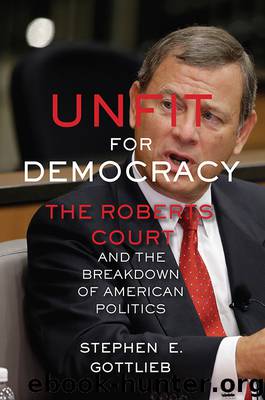Unfit for Democracy by Stephen E. Gottlieb

Author:Stephen E. Gottlieb
Language: eng
Format: epub
Tags: LAW000000 Law / General
Publisher: NYU Press
Iqbal’s complaint was one of many brought by major civil liberties organizations challenging the discrimination toward Muslims without any basis in factual information about them.20 But the Court’s treatment of Iqbal’s complaint made it difficult to hold federal officials responsible.
Rule 8 of the Federal Rules of Civil Procedure requires only that a complaint include “a short and plain statement of the claim showing that the pleader is entitled to relief.” It was adopted to eliminate the need to elaborate specific facts and legal theories in the complaint and to head off lengthy technical battles about what the complaint should have said.21 But the Court required the complaint to state the facts in some detail, continuing a redefinition of Rule 8.
Second, the Court eliminated liability for knowingly acquiescing in, or deliberate indifference to, the misbehavior of subordinates, even though counsel for Ashcroft and Meuller conceded that was the correct standard, and the issue had been neither briefed nor argued.22
Third, the majority treated Iqbal’s allegations of misbehavior as “conclusory” and “formulaic,” including allegations about who created and implemented what policy of discrimination.23
Fourth, having concluded that Iqbal’s allegations should be treated as conclusions rather than as facts, the majority concluded that Iqbal’s claims about Ashcroft and Mueller were implausible inferences from the existence of different treatment given Muslim men.24 Although the Court denied that it was making a judgment about what Ashcroft and Mueller actually did,25 its judgment about what counted as a factual allegation and its assessment of the implications of proof of discrimination reflected long-standing blind spots of the Court, and a lengthy battle between Congress and the Court about the evidence required to prove discrimination.26
Plausibility is a troubling standard because it invites judges to evaluate claims subjectively, based on their respect for the individuals, political ideologies, and exposure to the kinds of problems addressed in the complaints. One might compare the Court’s solicitude for the competing public obligations of President Clinton—when the Court refused to stay a private and legally implausible lawsuit that was later dismissed27—with its solicitude for the competing obligations of Attorney General Ashcroft in Iqbal and various prosecuting attorneys in Van de Kamp v. Goldstein and Connick v. Thompson in evaluating how reliably courts might assess other subjective standards like plausibility in the early stages of litigation.28 The system of notice pleading, abrogated only recently by the Roberts Court,29 is much more likely to produce reliable results.30
Following the Iqbal decision, my colleague Raymond Brescia examined the impact of both Iqbal and a prior ruling on which the Iqbal decision was based.31 Brescia concluded that Iqbal left courts much more likely to dismiss discrimination claims.32 The Court’s action fits a long pattern of making it difficult, if not impossible, to prove discrimination.33
In Ashcroft v. al-Kidd,34 the Court decided Attorney General Ashcroft and others involved were immune from responsibility for abusing the power to arrest and detain material witnesses by using it against people without any intention to put them on the stand. Neither Ashcroft’s nor the government’s motives mattered to the Court.
Download
This site does not store any files on its server. We only index and link to content provided by other sites. Please contact the content providers to delete copyright contents if any and email us, we'll remove relevant links or contents immediately.
Objection! by Nancy Grace(1776)
Apeirogon by Colum McCann(1691)
Anatomy of Injustice by Raymond Bonner(1653)
That Every Man Be Armed by Stephen P. Halbrook(1575)
Civil Procedure (Aspen Casebooks) by Stephen C. Yeazell(1539)
Injustices by Ian Millhiser(1497)
The Vaccine Court by Rohde Wayne(1494)
Storytelling for Lawyers by Meyer Philip(1452)
A Practical Guide to International Arbitration in London by Hilary Heilbron(1424)
Restitution by Restitution(1424)
Coercing Virtue by Robert H. Bork(1353)
Broken Scales by Joel Cohen(1347)
Tangled Webs: How False Statements Are Undermining America: From Martha Stewart to Bernie Madoff by James B. Stewart(1329)
The Tools of Argument: How the Best Lawyers Think, Argue, and Win by Joel Trachtman(1302)
A Matter of Interpretation by Antonin Scalia(1298)
INDEFENSIBLE: One Lawyer's Journey Into the Inferno of American Justice by Feige David(1278)
American Tragedy by Lawrence Schiller & James Willwerth(1266)
Tangled Webs by James B. Stewart(1244)
A Religious Orgy in Tennessee by H.L. Mencken(1240)
